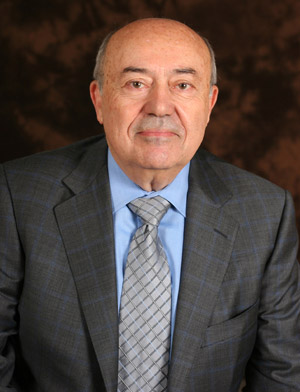By:
- Daniel Kane
Published Date
By:
- Daniel Kane
Share This:
Andrew Viterbi, Wireless Pioneer and UC San Diego Professor Emeritus, Wins Draper Prize

Andrew Viterbi. Image courtesy of USC
Andrew Viterbi, a renowned wireless pioneer, co-founder of Linkabit and Qualcomm, and UC San Diego professor emeritus has been awarded the prestigious Draper Prize—often referred to as the “Nobel Prize of Engineering”—from the National Academy of Engineering.
Viterbi was awarded the Draper Prize “for development of the Viterbi algorithm, its transformational impact on digital wireless communications, and its significant applications in speech recognition and synthesis and in bioinformatics.”
The Viterbi algorithm performs interference suppression and efficient decoding of digital transmission sequences. As wireless signals are transmitted through the air, for example, they pick up noise and interference. By the time a signal gets to the device on the receiving end of the signal, it is just an echo of the original signal.
The Viterbi algorithm provides an elegant way to recover the original signal and throw away the noise. Also, when space exploration probes send messages back from Jupiter, researchers use the Viterbi algorithm to decode the signals and remove the noise after millions of miles of travel.
Viterbi is one of the founders of Linkabit, the famed San Diego startup, and also a Qualcomm co-founder. At Qualcomm, Viterbi made major impacts with his work on the CDMA standard, which transformed the theory and practice of digital communications. CDMA or “code division multiple access” allows many users to share the same radio frequencies, and thereby increase system capacity many times over analog system capacity. Essentially all modern mobile phone standards incorporate some kind of CDMA.
Viterbi wrote CDMA: Principles of Spread Spectrum Communication, an early and influential book about CDMA that was published in 1995.
“Even while serving in his high-level management position at Qualcomm, Viterbi continued to make significant technical contributions,” said electrical engineering professor Paul Siegel. “For example, he found a novel approach to the decoding of turbo codes, a class of codes invented in the mid-1990's that offer better performance than convolutional codes and have been incorporated into key portions of the CDMA standards,” said Siegel, the UC San Diego Center for Memory and Recording Research (CMRR) professor.
The Draper Prize was established in 1988 to honor the memory of Charles Stark “Doc” Draper, the “father of inertial navigation,” and to increase public understanding of the contributions of engineering and technology.
Jack Wolf Endowed Professorship
Andrew Viterbi was both generous and instrumental in helping to create an endowed professorship in honor of his colleague and friend Jack Keil Wolf, a pioneer in information theory and its applications and longtime professor at the Jacobs School. Alexander Vardy, an electrical engineering professor at UC San Diego and renowned researcher in information and coding theory, holds the Jack Keil Wolf Endowed Chair in Electrical Engineering.
“Viterbi been a constant friend to many of us at UCSD. In addition to his major role in establishing the Wolf Chair, he has been very supportive of other technical and educational initiatives within the electrical engineering department, the Center for Memory and Recording Research, and the Information Theory and Applications (ITA) Center in the Qualcomm Institute. He is often in attendance at events associated with the Shannon Memorial Lecture, the Jack Keil Wolf Lecture Series, and the ITA Workshop. More broadly, his generous philanthropy extends to numerous cultural, educational, and social organizations, not only in San Diego, but throughout the world,” said Siegel.
On Thursday Feb. 18, Brian H. Marcus, Professor, Mathematics, University of British Columbia gives the Jack Keil Wolf Lecture in Information Theory and Applications. His talk is entitled “Capacity of Higher-dimensional Constrained Systems.” (PDF of talk flyer.)
Andrew Viterbi
Andrew Viterbi received his bachelor’s and master’s degrees from MIT, and his Ph.D. in digital communications from the University of Southern California (USC). In 2004 Andrew and Erna Viterbi committed $52 million to USC’s engineering school, which was renamed in their honor. Viterbi was a member of the communications research section of the California Institute of Technology Jet Propulsion Laboratory, where he was one of the first communication engineers to recognize the potential of digital transmission techniques for space and satellite telecommunication systems. He served as a professor at the UCLA School of Engineering and Applied Science until 1973 and continued teaching on a part-time basis at the University of California, San Diego until 1994. Viterbi is currently president of the Viterbi Group and a professor emeritus at the UC San Diego Jacobs School of Engineering.
Share This:
Stay in the Know
Keep up with all the latest from UC San Diego. Subscribe to the newsletter today.



